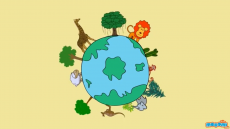

GCSE BIOLOGY REVISION: BIODIVERSITY AND THE EFFECT OF HUMAN INTERACTION ON ECOSYSTEM
Please note: Text in bold is what the AQA GCSE biology specification requires an understanding of.
A great biodiversity ensures the stability of ecosystems by reducing the dependence of one species on another for food, shelter and the maintenance of the physical environment.
If diversity is vast, this enables populations to thrive, and food chains to continue existing. As soon as one population starts to deplete, this has a knock-on effect as different species are dependent on another. This is called independence. For example:
Algae à zooplankton à sand eel à puffin à arctic skua. If the numbers of algae are reduced (for example due to pollution), then zooplankton are lacking in food. A lack of food will create a struggle for survival, therefore, the zooplankton population will begin to decrease. A decrease in zooplankton leads to a lower food supply for sand eels.
Ecosystems that have higher biodiversity have lower dependence for food, shelter and maintaining the environment. This is because there will be more alternatives rather than being dependent on one particular species.
The future of the human species on Earth relies on us maintaining a good level of biodiversity. Many human activities are reducing biodiversity and only recently have measures been taken to try to stop this reduction.
Gradually, we have realised the future of the human species and earth is dependent upon us helping to maintain biodiversity. We should therefore limit activities that will affect it. For example, air and water pollution. Species and habitats are being looked after through charity work, government regulations and individuals that have a passion for maintaining biodiversity.
WASTE MANAGEMENT
Rapid growth in the human population and an increase in the standard of living mean that increasingly more resources are used and more waste is produced. Unless waste and chemical materials are properly handled, more pollution will be caused.
Record level numbers of the human population have been reached. Each year, approximately 75 million more people are born than die, therefore a net increase. On a graph, this will produce an exponential curve. As the human population increases, so does the volume of waste and pollution. This waste is destroying our ecosystem. In our society, products are made and replaced more often, but the consumption is not sustainable. This is leading to a depletion of resources such as natural materials and fossil fuels. Fossil fuels are non-renewable, once they are finished, they cannot be brought back.
Pollution can occur:
in water, from sewage, fertiliser or toxic chemicals
in air, from smoke and acidic gases
on land, from landfill and from toxic chemicals.
Pollution kills plants and animals which can reduce biodiversity.
In various parts of the world, open sewers can lead into water courses (for example rivers and streams) which can then lead to serious illnesses for people that drink the contaminated waters. Contamination can occur through various routes…
image- https://www.youtube.com/watch?v=ErATB1aMiSU

0 Comment:
Be the first one to comment on this article.